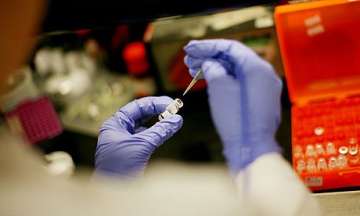New Delhi: Absence of blood testing laboratories in Kenya led to several doping violations recently, says former one-hour-run world-record holder athlete Jos Hermens.
Recently, two-time Chicago Marathon winner Rita Jeptoo tested positive for doping.
Prior to her, Mathew Kisorio, who has the world's third fastest timing (58.46 minutes) in half marathon, received a two-year ban in 2012, and said doping was not rare in Kenya.
Jemima Sumgong, who finished second to Rita in Chicago this year, also received a two-year ban after a failed dope test in 2012 which was later reversed.
These incidents have casted a doubt on Kenya's reputation as a powerhouse in long distance running and also remind of the gaping holes in the country's anti-doping system.
"The news of Jeptoo returning positive for Erythropoietin (EPO) was shocking. It is a hormone naturally produced by the kidneys which can be artificially produced to improve endurance by injecting it into the blood. It is a very common thing due to which athletes are getting caught nowadays," Hermens, whose Global Sports Communication manages many elite African athletes, told IANS.
"The doping control in Kenya is very difficult because there is no blood testing laboratory and EPO is a blood booster. For testing, the blood has to go to Europe and it is difficult to transport the blood. Blood testing is the most preferred way of catching athletes using EPO and growth hormones."
Hermens, who covered 20,944 metres for the world record in 1976, said EPO was a very complicated substance to detect.
"Fresh red blood cells live for 30 days only. So you not only need to consistently monitor the EPO level, but also track an athlete for more than two years to have an idea of the numbers that remain in the blood."
The 64-year-old, who competed for the Netherlands in the 10,000 metre race in the 1976 Olympics, said remote location of training areas in Kenya made it difficult to get blood samples to any accredited labs within the mandated 36 hours.
Hermens blamed pharmacists and sports physicians for the problem.
"Long distance running is a big business in Kenya and there is a lot of competition to get into the teams. So some doctors tell them they can run faster if they follow their advice. Several athletes are not educated enough and they fall into the trap. The doctors are to be blamed because what they are doing is crime."
Quizzed about his role in curbing doping, he said: "We educate them for learning nuances of running. We manage their daily affairs. Regarding doping, it's very important that every time they go to the hospital, they need to let us know because sometimes they get the wrong medicine and they can have a problem. We speak openly with them, warn them and also explain them the concept of dope control."
Hermens said Kenyans have so much talent that there is no need for doping. There are many factors that make them the strongest contenders in the discipline.
"First of all, they live in high altitude areas which help them develop red blood cells. They are used to living with less oxygen. When they come here or go to European cities, they find it a lot easier," he said, adding that the low standard of living made them physically tough.
"The current world half marathon champion Geoffrey Kamworor used to walk and run up to 10 km to school. So he has developed that fitness from a young age. Most schools in Kenya don't have buses so they go walking and running. That makes them fit from an early age."
Hermens said the African countries don't have many jobs on offer and this forces children to take up running as a career.
"They are very poor and it is difficult to find jobs so they see running as a lucrative career. They run, win and make good money," Hermens said.
